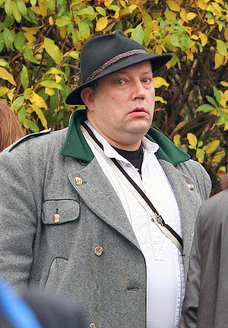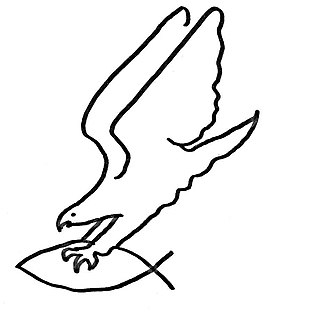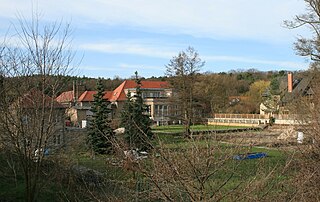
The Homeland, previously known as the National Democratic Party of Germany, is a far-right Neo-Nazi and ultranationalist political party in Germany.
The Nationalist Front was a minor German neo-Nazi group active during the 1980s.
Since its emergence in the 1970s, Neopaganism in German-speaking Europe has diversified into a wide array of traditions, particularly during the New Age boom of the 1980s.
The far-right in Germany slowly reorganised itself after the fall of Nazi Germany and the dissolution of the Nazi Party in 1945. Denazification was carried out in Germany from 1945 to 1949 by the Allied forces of World War II, with an attempt of eliminating Nazism from the country. However, various far-right parties emerged in the post-war period, with varying success. Most parties only lasted a few years before either dissolving or being banned, and explicitly far-right parties have never gained seats in the Bundestag post-WWII.

The Odeonsplatz is a large square in central Munich which was developed in the early 19th century by Leo von Klenze and is at the southern end of the Ludwigstraße, developed at the same time. The square is named for the former concert hall, the Odeon, on its northwestern side. The name Odeonsplatz has come to be extended to the parvis (forecourt) of the Residenz, in front of the Theatine Church and terminated by the Feldherrnhalle, which lies to the south of it. The square was the scene of a fatal gun battle which ended the march on the Feldherrnhalle during the 1923 Beer Hall Putsch.

Reichsbürgerbewegung or Reichsbürger is a label for several anticonstitutional revisionist groups and individuals in Germany and elsewhere who reject the legitimacy of the modern German state, the Federal Republic of Germany, in favour of the German Reich.
Anton Maegerle is the Pseudonym of a German journalist. He is also the author of books about far-right politics, right-wing radicalism, the New Right, and right-wing policy in general.
Heike Langguth is a German two times vice-champion in Muay Thai.

The Pro Germany Citizens' Movement was a far-right political party in Germany. It was founded in Cologne on 20 January 2005 after Pro Cologne members had been elected to the Cologne City Council. Manfred Rouhs, treasurer of the Pro Cologne movement and former candidate of the German League for People and Homeland and the National Democratic Party of Germany, was elected its first chairman. The federal party convent decided at its ninth ordinary meeting in Wuppertal on 11 November 2017 to dissolve the party.

The National Socialist Underground, or NSU, was a German neo-Nazi militant organization active between 2001 and 2010, and uncovered in November 2011. Regarded as a terror cell, the NSU is mostly associated with Uwe Mundlos, Uwe Böhnhardt and Beate Zschäpe, who lived together under false identities. Between 100 and 150 further associates were identified who supported the core trio in their decade-long underground life and provided them with money, false identities and weapons. Unlike other terror groups, the NSU had not claimed responsibility for their actions. The group's existence was discovered only after the deaths of Böhnhardt and Mundlos, and the subsequent arrest of Zschäpe.

ServusTV is a TV station based in Wals-Siezenheim in the Austrian state of Salzburg. Its name is derived from the popular greeting servus common in many parts of Central and Eastern Europe. Together with the magazine "Servus in Stadt und Land", it is owned by Red Bull Media House GmbH, a subsidiary of Red Bull GmbH. The station emerged in 2009 from the station Salzburg TV, which was founded in 1995.

Gottfried Küssel is an Austrian far-right political activist who also gained some notoriety in Germany. He has been a leading figure in neo-Nazism and Holocaust denial since the 1970s.
The Gylfilites' Guild, also known by the adherents' or movement's names the Gylfilites or Gylfilitism, is a Germanic Heathen sect of Ariosophical-Armanic orientation based in Krefeld, North Rhine-Westphalia, which gathered public attention in 1976. The sect published the magazine named Odrörir, the name of the mead of poetry. Since the 1990s the group has gone underground.

Jörg Hubert Meuthen is a German economist, academic and politician, serving as an Independent Member of the European Parliament (MEP) for Germany since 2017.
The Collegium Humanum was an ecofascist organisation in Germany from 1963 to 2008. It was established in 1963 as a club, was first active in the German environmental movement, then from the early 1980s became a far-right political organisation and was banned in 2008 by the Federal Minister of the Interior Wolfgang Schäuble due to "continued denial of the Holocaust".

The III. Path or The Third Path is a far-right and neo-Nazi political party in Germany.
Besseres Hannover was a right-wing extremist group from Lower Saxony. The group was banned in September 2012 by Lower Saxony's Interior Minister Uwe Schünemann. The ban became incontestable by order of the Federal Administrative Court of 6 January 2014. It also became known nationwide through the "Abschiebär", a character who appeared in propaganda videos and at various events in Germany.

Querfront is a German term originating in Weimar politics and referring to the cooperation between the far-right and far-left, or nationalist and socialist ideologies, as well as the combination of their positions. It is primarily understood as a strategy to unite forces in an effort to gain power. The term was first, and most prominently, used in the Weimar Republic, where it referred to the cooperation between conservative revolutionaries and the far-left.

Eagle catching fish or eagle catching ichthys is a German anti-Christian and neo-pagan hate symbol.

The meeting of right-wing extremists in Potsdam was a meeting in the Adlon Mansion on Lake Lehnitz in Potsdam, which took place on 25 November 2023. At the event, Martin Sellner, an Austrian right-wing extremist presented a plan for the deportation of certain parts of the population in Germany, namely asylum seekers, foreigners with a residence permit and "non-assimilated" German citizens. The meeting was attended among others by members of the German right-wing populist party AfD, the German Christian Democrat party (CDU), the Werteunion, and the far-right Identitarian movement. The meeting was exposed by the investigative journalism organization Correctiv, which published its findings on 10 January 2024.












